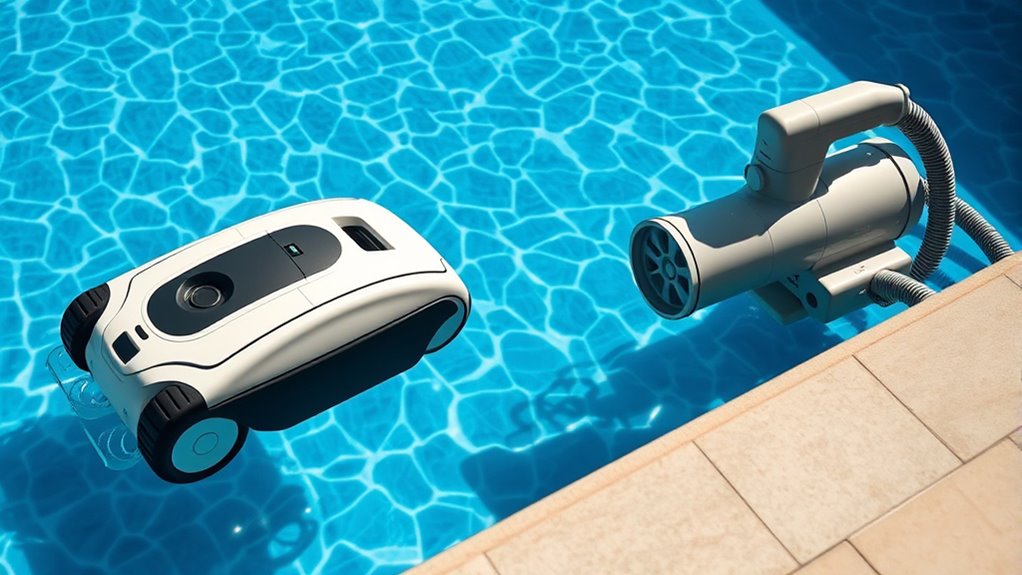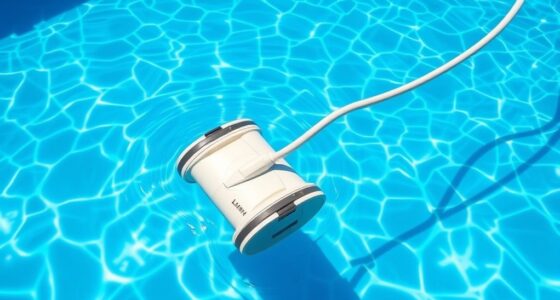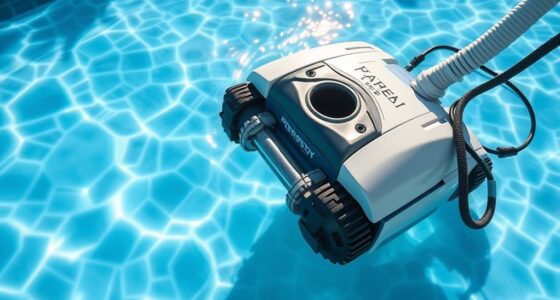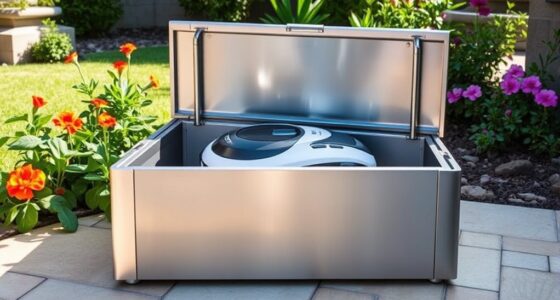Robotic pool cleaners offer advanced navigation, thorough cleaning, and low manual effort, but they come with higher upfront costs and maintenance. Suction cleaners are budget-friendly, simple to operate, and depend on your pool’s filtration system, making them ideal for small or straightforward pools. While robotic models handle complex shapes and delicate surfaces better, suction cleaners are easier for quick, basic cleaning tasks. To find out which fits your pool best, explore the details ahead.
Key Takeaways
- Robotic cleaners offer advanced navigation and thorough cleaning, suitable for large or complex pools, but come with higher upfront costs.
- Suction cleaners are budget-friendly, simple to operate, and ideal for small or shallow pools, though they may require more maintenance over time.
- Robotic models are energy-efficient, autonomous, and require minimal manual intervention, enhancing convenience and performance.
- Suction cleaners depend on the pool’s filtration system, which can increase operational costs and impact cleaning efficiency.
- The choice depends on pool size, shape, surface, and maintenance preferences, with robotic cleaners excelling in larger, intricate pools.

(2026 Upgrade) Aiper Scuba S1 Robotic Pool Cleaner, Wall & Waterline Cleaning, Double Filtration, Extended 180-Min Battery Life, Smart Navigation, App Support, OTA Upgrade
Trusted by 500,000+ Pool Owners: Chosen by over 500,000 pool owners worldwide, this robotic pool cleaner delivers proven…
As an affiliate, we earn on qualifying purchases.
As an affiliate, we earn on qualifying purchases.
How Robotic Pool Cleaners Work and Their Key Features
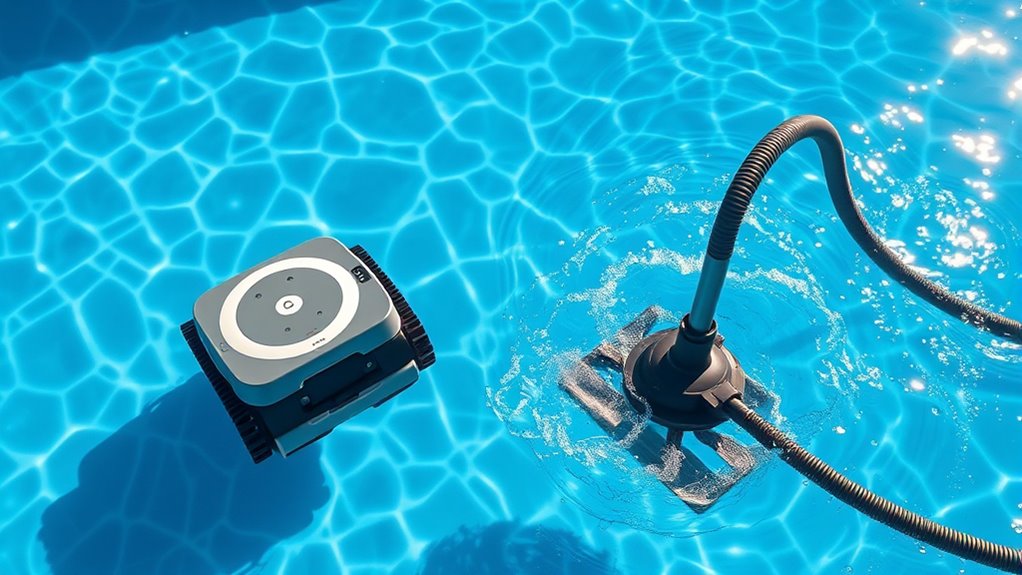
Robotic pool cleaners operate independently, using built-in motors and advanced navigation systems to efficiently clean your pool. They map out the pool’s surface, ensuring thorough coverage without missing spots. Before using a robotic cleaner, you’ll want to make certain of proper pool chemical balancing, as well-balanced water improves cleaning efficiency and prolongs equipment lifespan. During seasonal pool opening, robotic cleaners simplify the process by effectively removing debris and dirt accumulated over the off-season, saving you time. These cleaners are programmable, allowing you to set cleaning schedules that fit your routine. Their compact design helps them reach corners and tight spots that are harder for manual cleaning tools. Additionally, incorporating high-quality filtration systems can improve the overall cleaning performance and water clarity. The integration of automation technology further enhances their ability to operate seamlessly with minimal user intervention. Proper maintenance and regular filter cleaning can also extend the lifespan of your robotic cleaner and ensure optimal performance. Regularly inspecting the navigation system can help maintain their efficiency and prevent malfunctions. Moreover, choosing a model with user-friendly controls can make operation even easier for all users. Overall, robotic pool cleaners automate the cleaning process, making maintaining clear, healthy water easier and more convenient.

VINGLI Pool Vacuum Cleaner Automatic Sweeper Swimming Pool Creepy Crawler Vacuum with 33FT Hoses (Navy Blue&White)
Note:The vacuum requires at least a 3/4hp swimming pool pump or 1600ghp to function properly.
As an affiliate, we earn on qualifying purchases.
As an affiliate, we earn on qualifying purchases.
Advantages of Suction Pool Cleaners
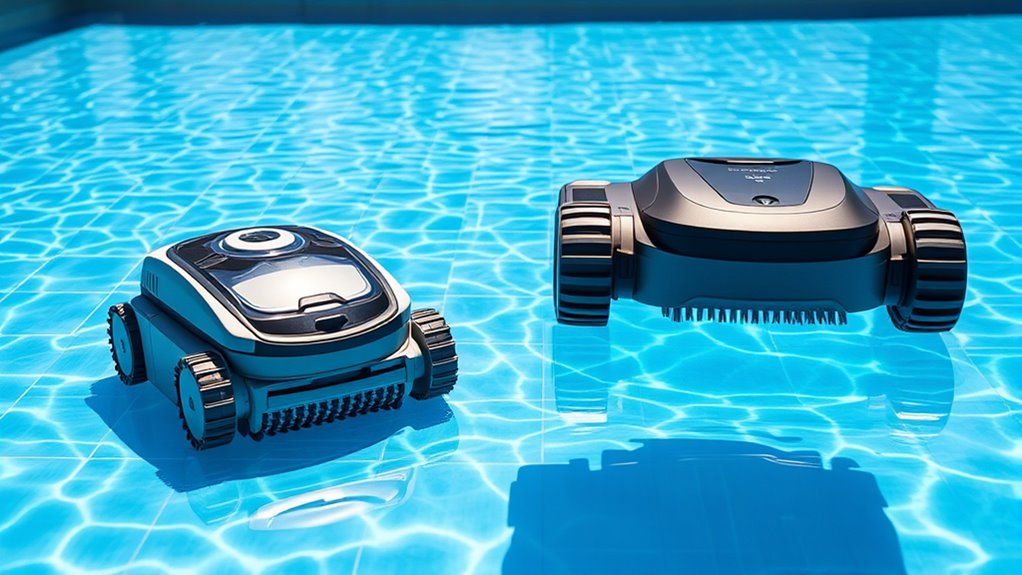
Suction pool cleaners are known for their simplicity and reliability, making them a popular choice for many pool owners. They excel in several areas, including:
- Energy efficiency – They use less power, saving you money on electricity bills. Understanding credit card terms can help pool owners manage their expenses more effectively.
- Fast cleaning speed – They quickly cover large pool areas, reducing cleaning time. They are especially useful for maintaining cleanliness between professional cleanings.
- Low maintenance – Fewer moving parts mean fewer repairs and easier upkeep. This simplicity also contributes to their overall durability.
- Cost-effective – Generally, they cost less upfront and have lower operational costs. Their affordability makes them accessible to a wide range of homeowners.
- Design features – Their compact design makes them easy to maneuver and store. This space-saving aspect is beneficial for storage in smaller pool sheds or garages. Additionally, their minimalist construction reduces the need for extensive repairs over time.
These benefits make suction cleaners ideal for those seeking an efficient, straightforward cleaning solution. Their energy-efficient operation and quick cleaning speed ensure your pool stays pristine without draining your resources or time.

(2026 Upgrade) WYBOT C1 Cordless Robotic Pool Vacuum for Inground Pools, Above Ground Pool Cleaner 4-in-1 Wall & Waterline Cleaning Up to 1,614sq.ft, 150mins Smart Navigation, App Support
Powerful Suction with Dual Brushes: Built with an upgraded independent water pump motor delivering up to 3,038 GPH…
As an affiliate, we earn on qualifying purchases.
As an affiliate, we earn on qualifying purchases.
Limitations and Challenges of Robotic Pool Cleaners
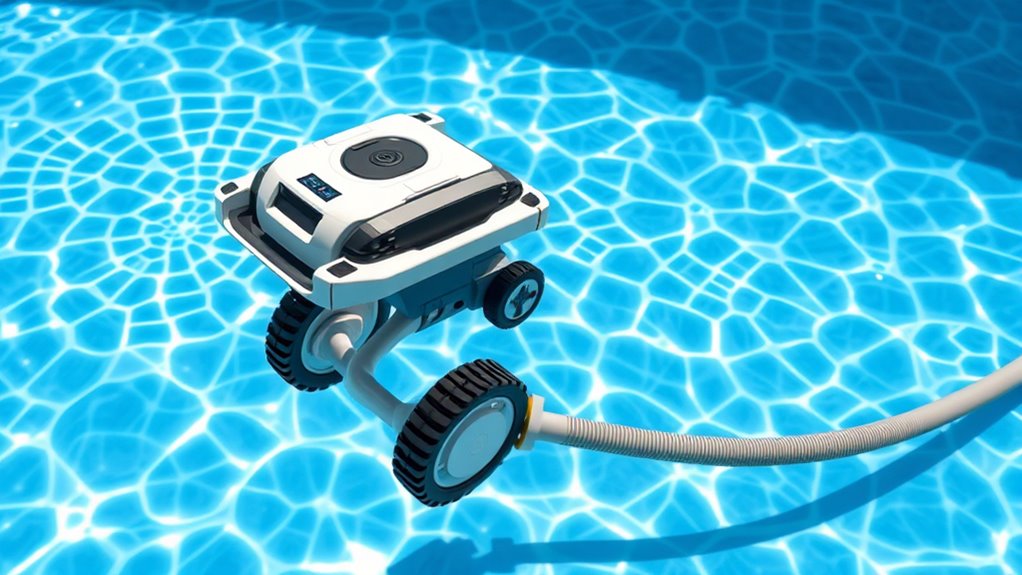
While robotic pool cleaners offer advanced features and convenience, they also come with certain limitations that can impact their effectiveness. One major challenge is battery life; many models require frequent recharging, which can disrupt cleaning cycles. Navigation limitations also hinder performance, especially in complex or larger pools, where the robot might miss spots or get stuck. These issues reduce efficiency and may require manual intervention. To better understand these challenges, consider the following:
| Limitation | Impact | Solution |
|---|---|---|
| Battery life | Shorter cleaning sessions | Opt for models with longer-lasting batteries |
| Navigation limitations | Missed spots, stuck robot | Choose models with advanced mapping features |
| Pool size & complexity | Reduced cleaning coverage | Use models designed for larger pools |
Additionally, some models may struggle with tuning features that optimize their movement, especially in pools with complex layouts. Regular maintenance and updates can help improve navigation accuracy and overall performance. Moreover, advancements in AI-driven solutions could potentially address some of these limitations in future models. For example, integrating machine learning might enable robots to adapt better to diverse pool environments. Furthermore, understanding the performance capabilities of a cleaner can guide users in selecting the most suitable model for their needs.

(2026 Upgrade) WYBOT C1 Cordless Robotic Pool Vacuum for Inground Pools, Above Ground Pool Cleaner 4-in-1 Wall & Waterline Cleaning Up to 1,614sq.ft, 150mins Smart Navigation, App Support
Powerful Suction with Dual Brushes: Built with an upgraded independent water pump motor delivering up to 3,038 GPH…
As an affiliate, we earn on qualifying purchases.
As an affiliate, we earn on qualifying purchases.
Cost Comparison and Maintenance Needs
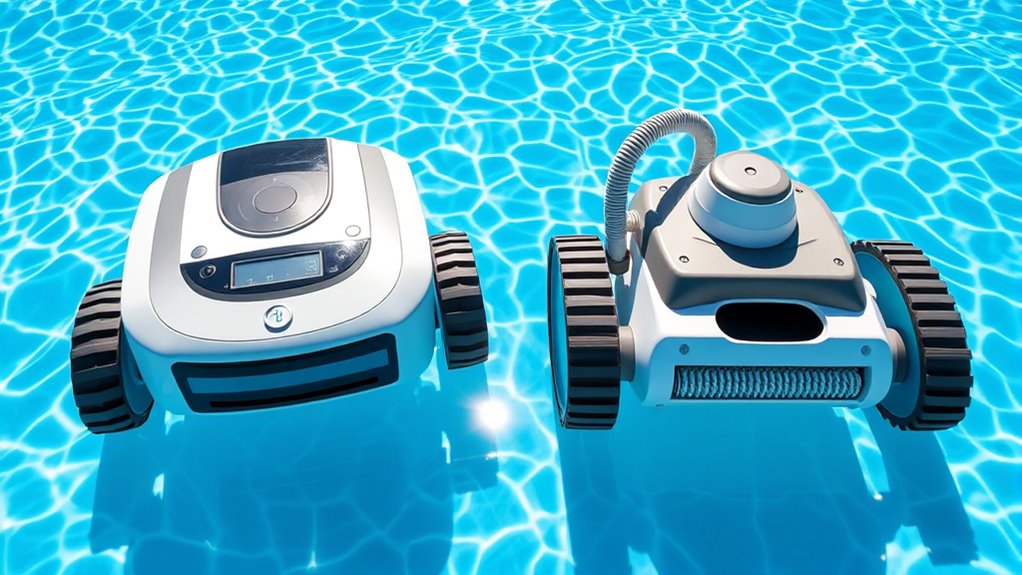
When choosing between robotic and suction pool cleaners, cost and maintenance are important factors to contemplate. Your budget options and long term costs can vary considerably. Consider these points: 1. Robotic cleaners often have a higher upfront price but lower ongoing maintenance. 2. Suction cleaners are generally cheaper initially but may require more frequent repairs. 3. Robotic models typically need minimal manual intervention, reducing labor costs. 4. Suction cleaners may need replacement parts more often, increasing long term expenses. Additionally, maintenance requirements can impact the overall well-being of your pool cleaning system, influencing your decision. Incorporating energy efficiency considerations can also help reduce operational costs over time, which is an important aspect of long-term savings. Furthermore, choosing models with advanced technology can improve cleaning performance and durability, ultimately supporting a more efficient pool maintenance routine. A careful assessment of cost-effectiveness can help ensure you select the best option for your specific needs.
Suitability for Different Pool Types and Sizes
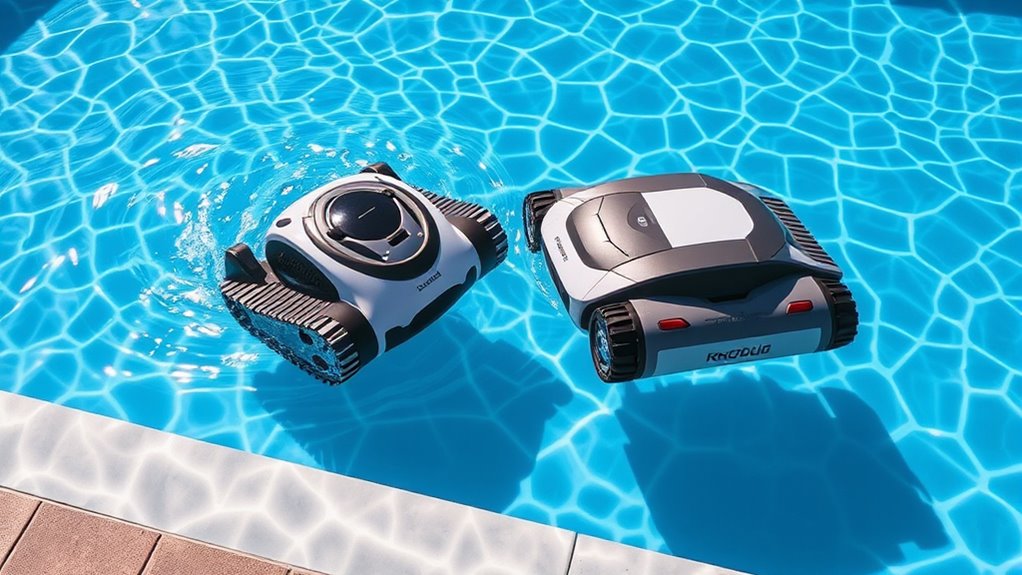
Your pool’s size and surface type play a big role in choosing the right cleaner. Some models work better on large or irregular-shaped pools, while others excel on specific surfaces like tile or vinyl. Ease of use can also vary, so consider how quickly you want to set up and operate the cleaner. Additionally, selecting a cleaner that is vetted for safety and reliability can help ensure a smooth maintenance experience. For instance, pools located in areas with water parks often have unique shapes and surfaces that may require specialized equipment for effective cleaning. Being aware of symptoms of malfunction can help you identify issues early and maintain optimal performance. Understanding the importance of proper maintenance practices can also extend the lifespan of your cleaning device and ensure consistent performance over time. Considering the self-watering plant pots concept can also provide insights into how efficient cleaning systems maintain consistent performance over time, reducing manual intervention.
Pool Size Compatibility
Choosing the right pool cleaner depends heavily on your pool’s size and shape. For larger pools, robotic cleaners excel because they cover extensive areas efficiently, especially in deep sections with varying water chemistry. Suction cleaners work well for smaller pools or shallow areas, but may struggle with deep zones. Consider these factors:
- Pool depth – Deeper pools require cleaners with strong suction and longer run times.
- Pool shape – irregular shapes may need customizable or more maneuverable robots.
- Water chemistry – high pH or chlorine levels can impact cleaner durability, especially for suction models.
- Size of the pool – larger pools demand robust, high-capacity cleaners to avoid frequent emptying or long cleaning cycles.
Matching your cleaner to these aspects guarantees effective cleaning without overburdening your equipment.
Surface Type Effectiveness
Surface type plays a crucial role in determining which pool cleaner works best for your setup. If your pool has a rough or textured surface, a robotic cleaner with strong algae resistance can effectively scrub away algae buildup without damaging the surface. Suction cleaners, on the other hand, may struggle with algae on delicate surfaces. For smooth surfaces like fiberglass or vinyl, both cleaner types typically perform well, but robotic cleaners often offer better surface protection, reducing the risk of surface scratches. Consider your pool’s material and size when choosing, as some cleaners are better suited for larger pools or intricate shapes. Ultimately, selecting a cleaner that matches your surface type will ensure thorough cleaning while maintaining your pool’s integrity.
Ease of Use
When considering ease of use, it’s important to recognize how different pool cleaners adapt to various pool types and sizes. Robotic cleaners often feature user interfaces that are intuitive, making setup and operation straightforward. They also come with smart storage solutions, like compact charging docks, that save space. Suction cleaners, on the other hand, generally have simpler interfaces and minimal storage needs, ideal for quick use.
Here’s what you should consider:
- Robotic cleaners excel in handling complex pool shapes and larger areas.
- They typically have digital controls for easy programming.
- Suction cleaners are lightweight and easy to connect to existing skimmers.
- Storage solutions for robotic models prevent clutter, while suction cleaners require less space overall.
Making the Right Choice for Your Pool Care
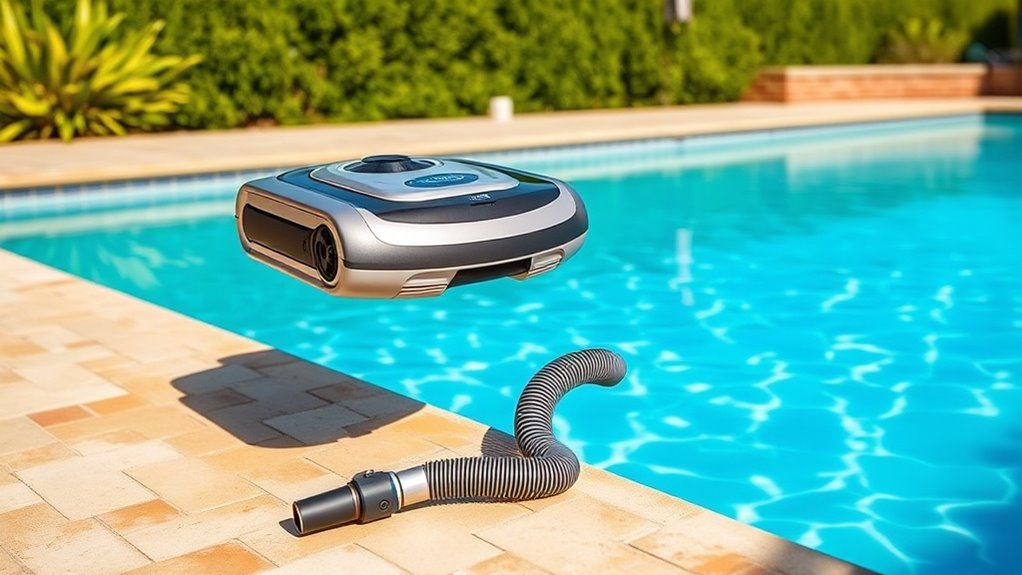
Deciding between robotic and suction pool cleaners hinges on understanding your specific pool needs, budget, and maintenance preferences. If you prioritize thorough cleaning with minimal effort, a robotic cleaner might be the better choice, especially since it often works independently of your pool’s filtration systems. However, if you want a more budget-friendly option that relies on your existing filtration system, a suction cleaner could suffice. Consider how pool chemicals and filtration systems interact—robotic cleaners often do a better job cleaning debris without disrupting chemical balance. Think about your pool size, shape, and how often you want to clean. Making an informed choice ensures you maintain sparkling water and extend your equipment’s lifespan, saving time and money in the long run.
Frequently Asked Questions
Which Pool Cleaner Is More Energy-Efficient Overall?
When choosing a pool cleaner, you wonder which is more energy-efficient overall. Your goal is to find the device with lower energy consumption, making it cost-effective and eco-friendly. In an efficiency comparison, robotic pool cleaners often use less power because they operate independently and optimize their cleaning patterns. Suction pool cleaners, connected to your pump, tend to consume more energy due to their reliance on your filtration system.
How Do Robotic and Suction Cleaners Perform in Algae Removal?
Imagine algae as stubborn green patches clinging to your pool walls. Robotic cleaners excel in algae removal, meticulously scrubbing surfaces and improving cleaning effectiveness. They navigate corners and uneven spots better, ensuring thorough algae cleanup. In contrast, suction cleaners may struggle with algae, especially in hard-to-reach areas, making robotic options your best bet for holistic algae removal and improved overall pool cleanliness.
Are Robotic Cleaners Suitable for Above-Ground Pools?
You’ll find robotic cleaners are quite suitable for above-ground pools, thanks to their compact size and ease of maneuverability. They work well with pool cover compatibility, making maintenance straightforward even when the cover is on or off. These cleaners efficiently target dirt and debris, saving you time and effort. Just ensure the robotic cleaner you choose is compatible with your above-ground pool’s size and shape for peak performance.
Can Robotic and Suction Cleaners Handle Heavy Debris?
Imagine trying to sweep up leaves after a storm—some tools handle heavy debris better. Robotic cleaners often excel in debris handling and have higher debris capacity, making them effective for large messes. Suction cleaners may struggle with heavy debris, clogging or missing spots. For pools with lots of debris, a robotic cleaner’s ability to manage heavy debris offers an advantage, ensuring your pool stays clean even after a heavy storm.
What Are the Safety Concerns Associated With Each Type?
When considering safety concerns, you should be aware of electrical safety risks with robotic cleaners, especially if water leaks or damage occur to electrical components. Suction cleaners pose mechanical hazards if not handled properly, like pinching or trapping fingers. Always follow manufacturer instructions, keep electrical parts dry, and supervise the equipment during use to prevent accidents. Regular maintenance and inspections help minimize these safety risks for both types.
Conclusion
Choosing between robotic and suction pool cleaners depends on your pool’s size, shape, and your cleaning needs. Did you know that robotic cleaners can cover up to 98% of your pool’s surface area? With 70% of pool owners reporting time saved using robotic or suction cleaners, it’s clear both options boost convenience. Consider your pool’s specifics and your budget to make the best choice—either way, you’ll enjoy cleaner water with less effort.
